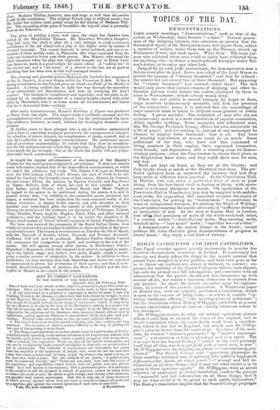T OPICS OF ME DAY.
DEMONSTRATIONS.
LIKE county meetings, "demonstrations," such as that of the sailors on Wednesday, have become " a farce." Certain gentle- men of the shipping interest, who entertain an opinion that the threatened repeal of the Navigation-laws will injure them, collect a number of sailors, make them ride up the Thames, march up Parliament Street, and back again. What then? The same per- sons who collected these men could as easily have collected them for anything else—to dance a multitudinous hornpipe under Nel- son's statue, or to enjoy any other lark. Judged by its own puffs preliminary, the demonstration was a failure even after its kind. Leave was asked of the Lord Mayor to permit the passage of "twenty thousand," and this he refused : the muster did not exceed two or three thousand. But supposing the "twenty thousand" had arrived—what then? The fact would only prove that certain owners of shipping and other in- fluential persons could induce the sailors employed by them to come to Westminster ; which nobody would deny. When the real public is moved strongly by hopes or fears, large numbers spontaneously assemble, and seek the presence of the authorities; hence it is inferred that the assemblage of large numbers must be taken to indicate some general or public feeling. A great mistake. The collection of men who are not spontaneously moved is a mere simulation of popular commotion, which signifies nothing. Some energetic and influential man, like Mr. George Frederick Young, effuses his own sentiments on a bit of paper ; and for sending it., instead of one messenger he chooses to employ three thousand ; that is all. Any knot of wealthy coal-owners or miners could do as much. Some politicians of the day, who have not this command of living numbers in their employ, have organized themselves, their friends, and dependents, into a standing corps for demon- stration purposes : allow the Free-traders to choose their place, as the Shipowners have done, and they could show man for man, any day. Mobs are kept on hand, as they are at the theatre; and they typify about as much as the theatrical mob does. The pro- fessed agitators have so improved the business that now they keep mobs of different kinds assorted. At the Conciliation Hall, in Dublin, you can order a particular kind of mob to your liking, from the best broad cloth to fustian or frieze, with opera. canes or well-used bludgeons to match. On application at the Free-trade Hall in Ma.nehester, you may be supplied with middle-s class mobs, for supporting that immortal measure the repeal of the Corn-laws, for getting up " testimonials " to gentlemen in want of independent fortunes, for abusing the Duke of Welling- ton, or misrepresenting the pacific advocates of "sufficient defence" as instigators of war. At the door of Exeter Hall in London, you oftqp find specimens of mobs of the white-neckcloth order, "a variety within "—Anti-Slavery mobs, May-meeting mobs, musical mobs—" best metes" mobs ; "superfine woolen's ditto." A demonstration is the easiest things in the world ; except perhaps Mr. John Hullah's great demonstrations of progress in choral music : they imply a real kind of victory.


























 Previous page
Previous page